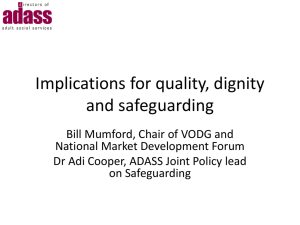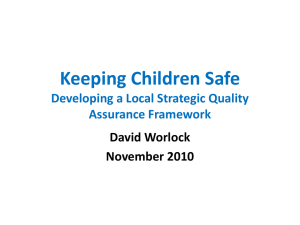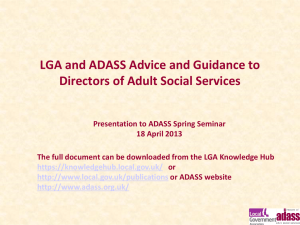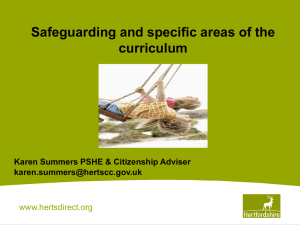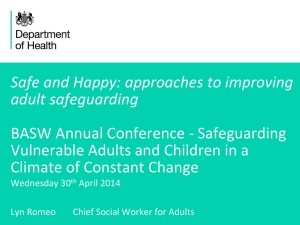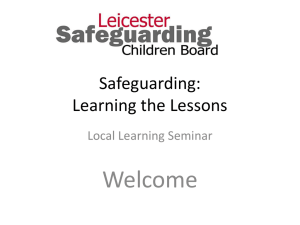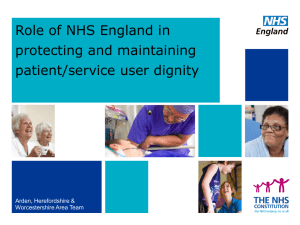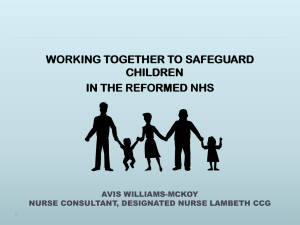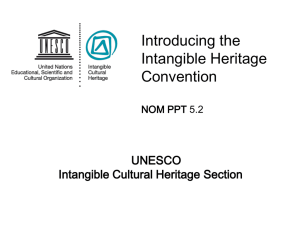TP4 Making Adult Safeguarding Personal Cathi Williams Adi
advertisement
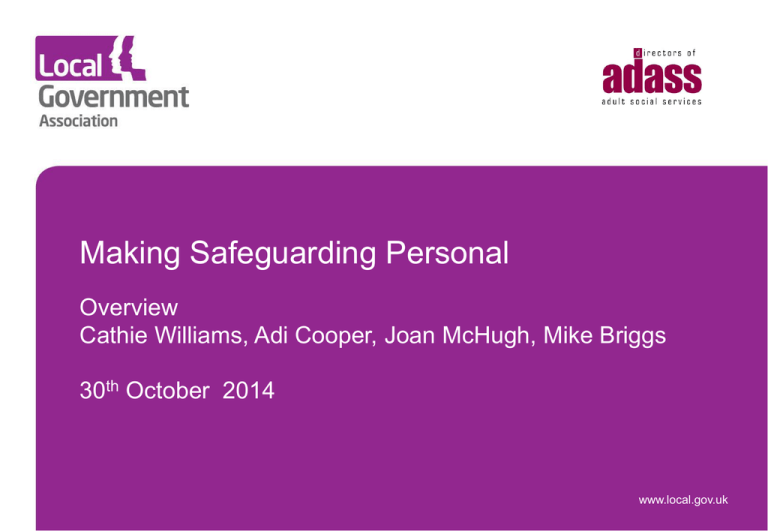
Making Safeguarding Personal Overview Cathie Williams, Adi Cooper, Joan McHugh, Mike Briggs 30th October 2014 www.local.gov.uk Making Safeguarding Personal: background A sector led initiative in response to findings from peer challenges, consultations, regional work and engagement etc. To develop an outcomes focus to safeguarding work, and a range of responses to support people to improve or resolve their circumstances. 2011/12: A Toolkit of Responses developed 2012/13: 4 Councils were ‘test beds’ 2013/14: 53 Councils participated 2014/15: Mainstream in all Councils What we wanted to achieve: • A change in practice that enables safeguarding to be done with, not to, people • A new focus on achieving meaningful improvement to people’s circumstances, rather than just on ‘investigation’ and ‘conclusion’ • Practices and activities that utilise social work skills better than just ‘putting people through a process’ • Something that enables practitioners, families, teams and Safeguarding Adults’ Boards know what difference has been made through safeguarding work and interventions Aims and engagement Aim: to facilitate person-centred, outcomes focussed responses to safeguarding that can be measured and aggregated in order to ascertain the effectiveness of safeguarding adults work. Councils are invited to work at 3 levels (not a hierachy): Bronze = working with people (and their advocates or representatives if they lacked capacity) to identify the outcomes they want and the extent to which they were realised (at start and end of safeguarding process) Silver = above plus developing one or more types of responses and/or recording and aggregating information about outcomes Gold = the above, plus independent evaluation of a project by a research organisation What 53 councils did in 2013/14 • All had very different starting points: some undertook small scale work with selected staff or selected groups of people who receive safeguarding support; others undertook ambitious staff training, IT and other development work, and worked with a greater range or number of people • The vast majority worked at the ‘bronze’ level, and that was challenging; 3 worked at ‘silver’ level; 2 worked at ‘gold’ level • Most activity took place between October 2013 (after the workshops and preparation) and December 2013 (prior to impact statements being returned at the end of January 2014) • 22 councils stated that they worked with 546 cases in total: an average of 24.8 per council. Extrapolating this means that perhaps 1066 people were worked with in a different way Key findings 2013/14 • Councils reported that this is a major practice and organisational change • Many councils gathered and reported on both qualitative and quantitative evidence to demonstrate that good outcomes were achieved (using more than one measure of effectiveness) • Every council reported benefits to social work practice • Many said ‘leadership and champions are key to success’ • Sound practice in applying the Mental Capacity Act and Deprivation of Liberty Safeguards in safeguarding is needed • The majority of councils said that assessment and management of risk is integral: person centred safeguarding supports risk enablement Making Safeguarding Personal Programme - 2014/15 • Department of Health support to mainstream MSP • Making Safeguarding Personal included in the draft Care Act guidance and is considered key to implementation • Recruitment of Councils – started in April 2014 • 2013/14 Report, MSP Guide, Tools etc published April 2014 • Phase 1 - 83 Councils attended 4 workshops in July • Phase 2 – 60+ Councils attended 4 workshops in September • Publicising MSP at Conferences, events and meetings • Support for individual Councils developing • Regional safeguarding events planned for December-January • Evaluation commissioned from Ripfa to report in May 2015 Making Safeguarding Personal Joan McHugh Safeguarding Adults Development Manager joan.mchugh@solihull.gov.uk On behalf of Solihull Safeguarding Adults Board 8 8 Aim To Provide an update of the MSP work we have undertaken so far, what we have learned so far and what we plan to do next … 9 9 What did we do in Solihull We asked practitioners between September – December 2013 •to complete a feedback questionnaire – how confident were they in using an outcome based approach to safeguarding. •use an aide memoire (designed to act as a prompt) when discussing outcomes with people. •To record (3) outcomes wherever appropriate at the beginning middle and end of an investigation •Record if outcomes were met, partly met or not met •Ask service users if they would provide an advocate with some feedback on their experience at the end of the investigation. 10 10 What we learned - Strengths •Practitioners were very positive about this approach and felt it moved their practice away from being so process driven to a much more person centred. •There was greater involvement of service users. •An increased confidence felt by practitioners. •An increase in positive risk taking •Practitioners were keen to use the tools and develop peer support to promote the approach. 11 11 Some Challenges •Demands of Time •The need for recording/IT systems to be responsive to person centred practice. •Difficulty in maintaining outcomes at the centre of the whole process. •Difficulties in using the approach with those who lack mental capacity. •A need to promote the use of advocacy wherever appropriate. 12 12 What we plan to do next • Keep the approach alive and active – promote ownership. • Greater use of advocacy services. • Increase the participation of service users at case conferences. • Ensure outcomes are at the heart of adult care learning and development – not an add on. • Consider any implications of this approach as the Care Act is implemented. • Share our tools, guidance and experience with other Local Authorities. 13 13 Any Questions? ANY QUESTIONS OR COMMENTS? 14 14 Some questions for you…. What are your experiences of MSP so far? What has been most challenging/ rewarding? How do you know what difference your safeguarding work makes? Care Act 2014 New safeguarding duties for councils • To make enquiries, or ensure others do so • Set up a Safeguarding Adults Board (SAB) with core membership from the local authority, the Police and the NHS • Arrange, where appropriate, for an independent advocate to represent and support an adult who is the subject of a safeguarding enquiry or Safeguarding Adult Review • Core partners to co-operate in order to protect adults experiencing or at risk of abuse or neglect. Safeguarding Adults Boards must: • Publish a strategic plan for each financial year that sets out how it will meet its main objective. • Publish an annual report detailing what the SAB has done during the year to achieve its objective and what it and each member has done to implement its strategy. • Decide when a Safeguarding Adults Recview is necessary, arrange for its conduct and implement the findings. • (The purpose of an SAR must be to learn lessons and improve practice and inter-agency working.) • The SAB can require information from an organisation or individual relevant to its functions. Care Act: Draft Statutory Guidance Informs and informed by MSP • LA must arrange independent advocate where adult has ‘substantial difficulty’ in being involved in contributing • Aims of adult safeguarding include: ‘to safeguard individuals in a way that supports them in making choices and having control in how they choose to live their lives’; ‘to promote an outcomes approach in safeguarding that works for people resulting in the best experience possible’ Care Act: Draft Statutory Guidance ‘avoid safeguarding arrangements that do not put people in control of their own lives, or that revert to a paternalistic and interventionist way of working. People have complex lives and being safe is only one of the things they want for themselves’ ‘We are all individuals with different preferences, histories, circumstances…It is...unhelpful to attempt a prescriptive process that can be followed in every case for concern’ Key Points • The Act and guidance signals a major change in practice • There are greater roles set out in relation to prevention and early intervention • Enquiries should be made by the most appropriate professional or organisation • A move away from the process-led, tick box culture to a person centred social work approach which achieves the outcomes that people want. • Practitioners must take a flexible approach and work with the adult all the way through the enquiry and beyond where necessary. • The advances in personalisation of social care go hand-in-hand with the new approach to safeguarding; the two concepts are also inseparable from quality of life and dignity. • There must be enough capacity to provide an advocate to individuals when they are unable to speak for themselves without support. ANY QUESTIONS OR COMMENTS? Contact / Information Local Government Association KHub – safeguarding adults community of practice Cathie.Williams@btinternet.com Adi.cooper@sutton.gov.uk mbriggs125@gmail.com joan.mchugh@solihull.gov.uk
